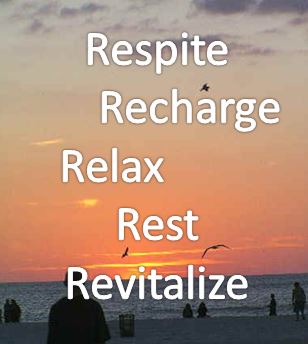 The dictionary’s respite care definition is “a short period of rest or relief from something difficult or unpleasant” or “an interval of rest or relief”. Respite care generally refers to care provided to offer such a break to a primary caregiver. Respite might be provided full-time for a period such as a week or two (for example while a caregiver travels) or might be provided on an intermittent basis (such as every afternoon or once/week so the caregiver can run errands, rest or attend an activity). You can find a good overview of respite care in Aging Wisely’s post, “Caregivers: Options for Respite“.
The dictionary’s respite care definition is “a short period of rest or relief from something difficult or unpleasant” or “an interval of rest or relief”. Respite care generally refers to care provided to offer such a break to a primary caregiver. Respite might be provided full-time for a period such as a week or two (for example while a caregiver travels) or might be provided on an intermittent basis (such as every afternoon or once/week so the caregiver can run errands, rest or attend an activity). You can find a good overview of respite care in Aging Wisely’s post, “Caregivers: Options for Respite“.
Respite care is the ideal solution for caregivers to stay healthy and prepared to continue caregiving. Each caregiver may feel the need for respite care at different points or may have varying comfort levels with the length and type of break. Fortunately, in-home respite care, such as that provided by EasyLiving in Clearwater, St. Pete and surrounding areas, is flexible to almost any schedule.
What are the benefits of in-home respite care?
- Your loved one can stay in a familiar environment, maintain comfortable surroundings and routine.
- Care can be customized to the individual.
- Respite provides you and your caree the opportunity to get to know caregivers and become comfortable with home care assistance, which can be handy for future caregiving needs.
- The home caregiver can help with everything from physical tasks to errands, meal preparation, senior transportation and more.
- Your loved one doesn’t have to miss appointments or usual activities.
To help you prepare, download our respite care checklist. This provides you advice and tips on making sure things go smoothly for your respite care experience. Caregivers often feel very nervous about someone new helping out; being prepared can make all the difference.
Sometimes a caregiver will face an emergency, such as a health problem or family crisis. One good thing about using respite care over time is that you will have a known resource to call. Even if you do not need respite care now, consider a test run or at least gather some information on respite options. If you need emergency respite care, it will be a huge relief to know you have done your homework beforehand. In-home respite care can typically be provided round-the-clock, so if you are hospitalized or dealing with some other emergency situation, caregivers can provide a safety net for you and your loved one.
Some other tips in case you need emergency respite care:
- Put together a notebook of key information for substitute caregivers including important contacts, medical history, a medication list and an overview of routine and daily habits.
- Tell a loved one or close friend how to access important information and backup plans for care. Ideally, this point person would be your loved one’s secondary healthcare surrogate, in case you were unable to act. Consider this when planning with your legal advisor (and make sure you’ve taken care of your legal and advance directives planning too).
- Do some research and consider interviewing providers. Our article Five Tips for Finding Quality Home Care Providers can help.
- Proactively taking respite can, in fact, help you avoid needing emergency respite care. Remember, rest is vital to you being able to continue providing quality care to your loved one. Try short breaks if you are uncomfortable doing more (respite care for short breaks can be quite affordable too).
EasyLiving, Inc. is a licensed home health agency in Pinellas County, Florida. We provide short-break respite care, round-the-clock help for traveling caregivers and emergency respite care in St. Petersburg, Clearwater, Dunedin, Palm Harbor and surrounding towns. Contact us today at 727-447-5845 for respite care or home care assistance.
Our focus on our caregiver team means that we can provide the type of high-quality care you expect. We do many things differently, and welcome the chance to talk to you about how we can help you and your family.







